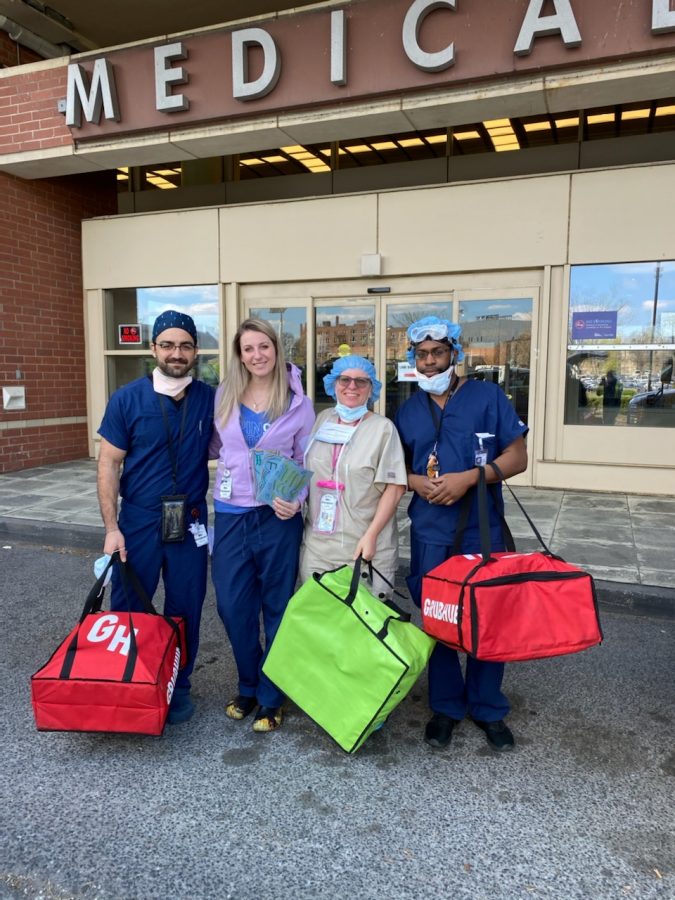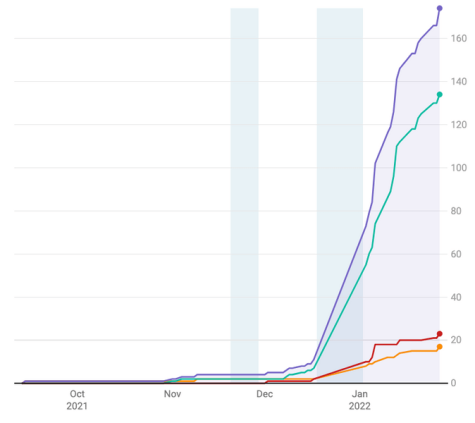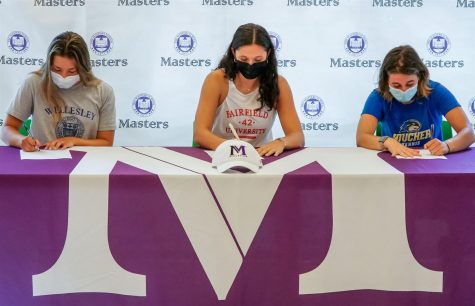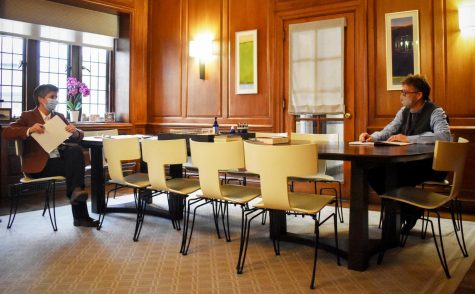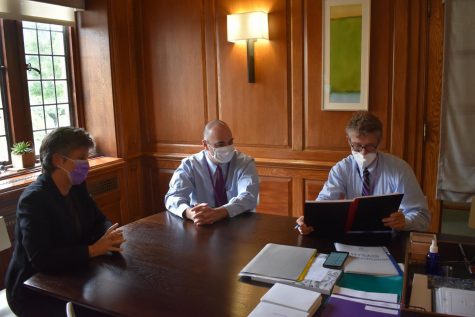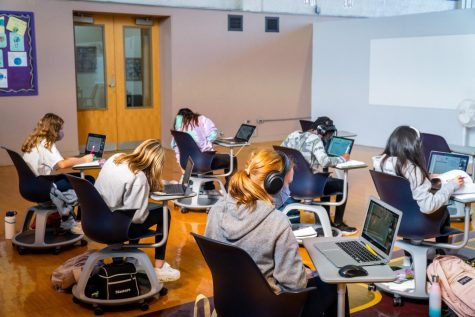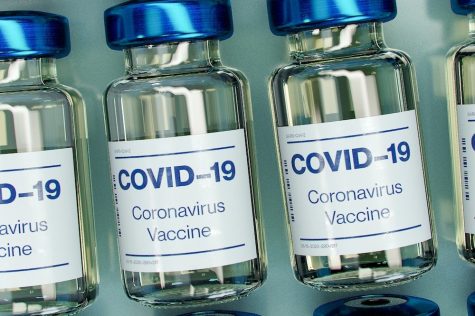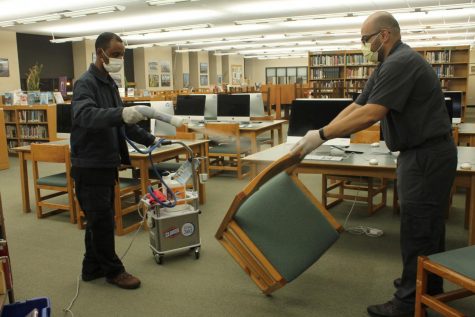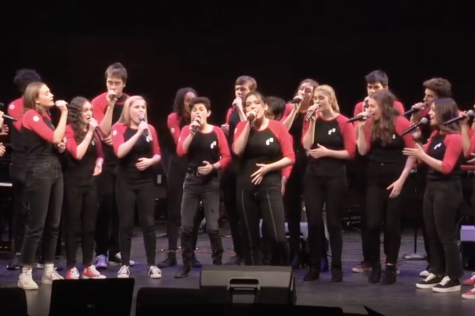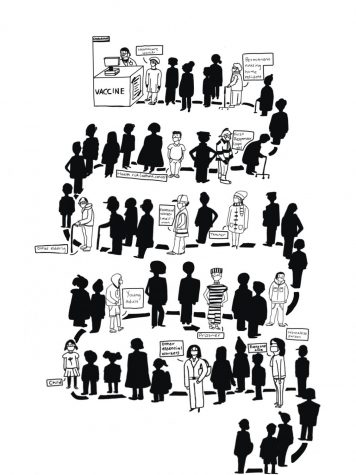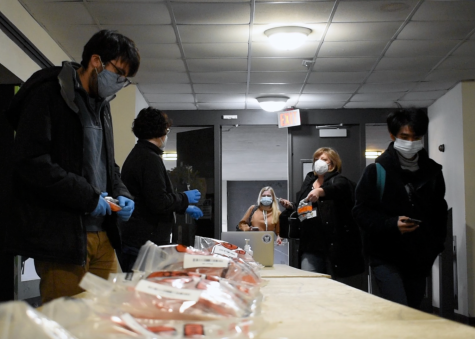Power For Good: Essential workers in our community
Photo courtesy of Kyla Barantsevitch
Essential workers stand outside their hospital, receiving meals during their shifts. Healthcare workers have had to work extra shifts and take pay cuts due to the ongoing pandemic.
May 11, 2020
Grocery workers. Delivery people. ER nurses. The list of people who hold jobs that are considered “essential” can go on and on. Within our own school community there are many students whose parents are these types of workers. And while the current coronavirus pandemic compels millions of Americans to become more cognizant and appreciative of the workers who put themselves in harm’s way everyday in order to carry on essential functions throughout the country, these essential workers are facing unprecedented hardships within their jobs everyday.
Full disclosure: my own mother is a doctor at a public New York City hospital (name of the hospital cannot be shared for confidentiality reasons). Facing a shortage of workers and an influx of COVID -19 patients, her hospital put my mother in charge of a whole floor of COVID-19 patients, meaning that she’s in the ICU (intensive care unit) surrounded by infected patients everyday. Furthermore, like many hospitals in the nation, her work place is facing shortages of PPE (personal protective equipment), forcing medical workers to rewear masks much longer than they were intended to do so.
The intensity of my mother’s new work schedule has impacted my sister and me at home. While we all live together in the same house, we both try to keep our distance from our mother, and as a family we even discussed potentially having her move into the basement for a little while, as to avoid spreading the virus to my sister and I, as she has high exposure to it everyday.
However, our situation is not unique to the Masters community as there are plenty of students within the school whose parents are considered essential workers as well.
Junior Zachary Spivack’s father is a pulmonologist at a hospital in the city, and while he is not really interacting with patients in the ICU but rather reviewing cases, his family is still taking precautions. His family too, is staying apart from each other in the house, and while Zach says these aren’t huge changes that are happening, the effects of the pandemic are “still kind of strange”.
Spivack also commented on how the pandemic has affected his father’s work schedule, as it has now become much more irregular, with him going to work on days he typically hadn’t in the past.
Furthermore, Spivack’s father now not only sees his usual base of patients, but also new ones, significantly adding to his work load.
Jadah Ramdyal, a sophomore, has two parents who are considered essential workers. Ramdyal’s mother is a medical biller at a city hospital, while her father works at Masters as a custodian. Since the pandemic, Ramdyal’s father was promoted to weekend supervisor, which means he still needs to go to the school. While Ramdyal’s mother had to still go to work at the hospital everyday for work as she had association with private patient information, this past week she was actually given permission to work from home.
Ramdyal’s father however still has to go to work, and she says that this has, “been a lot more work to go through, being more cautious of anything [her parents] touch,” making sure that Ramdyal’s parents are being as careful as they can to make sure they aren’t spreading anything.
And while this new situation has been stressful, Ramadyal is still grateful that her parents are still working, as she knows that many have lost their jobs recently.
Senior Leron Dugan’s mother is a social worker, and while the virus has her working from home most days of the week, she still goes to her office around two times a week. Dugan’s family practices social distancing as a precaution, and Dugan mentions that they are fortunate to have a couple of N95 masks.
Senior Rosemary Termini’s mother is also a social worker who still goes to her hospital for work everyday. While the clinic area where her mother works doesn’t currently have any COVID-19 patients, there is still the risk of exposure.
Termini said, “There have been a few times where patients come into the clinic who they later find out, or who later gets diagnosed, with COVID-19, which is pretty scary.” This has caused Termini’s mother to have to take extra precautions, and has added an extra layer of stress at home knowing that she could be bringing something home. Despite this, Termini still thinks of herself as lucky because she recognizes that other people might have it much worse.
Dugan further comments that while this pandemic has not only personally made him become more cautious, it has also shed a light of many of the systemic issues currently plaguing our nation. He mentions while our community has always tried to make students more aware of their privilege, he cautions people to be extra aware of the privilege they have in this current state of the pandemic.



